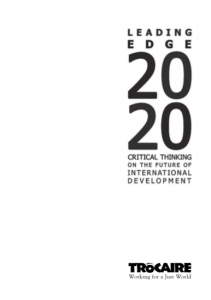Resource Title
Leading Edge 2020: Critical Thinking on the Future of International Development
Summary
This report investigates the future trends which will shape international development and in particular international non governmental organisations (INGOs) in the coming decade. It is intended to be a resource which will provoke discussion on key issues facing development organisations. The project involved some 87 experts across the world in a series of guided conversations on the future of international development.
Resource Details
Description
At a manageable 88 pages in length, this is the first Leading Edge report to be made publicly available. It is hoped that it will benefit the development sector in Ireland and internationally.
While the report does not make statistically significant findings nor does it test the assumptions of the participants, the report is driven by the qualitative interviews it gathered from the research participants.
The report has been compiled from two main sources: 1) a selective literature search looking at both the current context and future predictions for internal and external issues likely to impact on development. 2) a series of in-depth interviews carried out in 2010 with 87 experts in the field of international development, government and the private sector across the world.
The purpose of this report is to provoke discussion around the key challenges facing those working in international development in the coming decade. In particular, it asks where the ‘leading edge’ will be for INGOs like Trócaire.
Big Ideas in this Resource
Global Trends
The five major global trends identified in the report are climate change, shifting geopolitics, demographic change, pressure on natural resources and widening inequality. None of these issues are particularly startling – they appear in newspapers and journals on a daily basis. The key issue is whether the development sector, and INGOs in particular, are equipped to embrace the brave new world towards which these trends point and which specific challenges they raise.
Ten things INGOs need to do:
In order to meet the challenges of the changing global context, INGOs need to:
1. Do more and better advocacy, harnessing their potential to bring about change. Advocacy must be evidence-based using local knowledge and stronger analysis. INGOs must work in collaboration, ensure their advocacy is partner-led and informed by the work on the ground, and work in closer partnership with the South, supporting rather than stifling or usurping the voices of their Southern partners.
2. Ensure downward accountability towards those they serve. INGOs have played a powerful role in holding governments and international organisations to account, but have not always been as stringent in their own accountability. It is essential they place as much emphasis on their accountability to the needs of the people they serve as they do to those who fund their work, involving partners more in shaping their policies and decisions. They must not confer false legitimacy on all Southern NGOs without questioning who they represent and they must develop a shared vision of partnership, where key decisions are taken together.
3. Become more flexible and responsive. This means being able to shift resources and focus as priorities change – without falling into the trap of reacting to fads or temporary trends. They must invest time and money in critical thinking and learning that will allow them to discern new challenges. They must work with other INGOs to remove rigid frameworks which make it difficult to shift priorities.
4. Engage with power and politics and how they influence the contexts in which they work at home and abroad. They need to engage more directly with the political implications of their work and how power and politics influence their identity and the change they are seeking.
5. Build Southern civil society capacity. INGOs must support the transition as Southern organisations carry out many of their functions. They need to ensure that the capacity support they provide is high quality, sustainable and meets need on the ground.
6. Plan for a changed funding environment. It is likely that funders will move towards larger, longer term contracts focused on service delivery. INGOs who wish to compete must achieve efficiencies and build technical capacity in competition with the private sector. It is unlikely that many small or medium sized INGOs will achieve the scale or technical capacity to compete for large competitive tenders. They will need to diversify their funding base.
7. Develop stronger analysis of the local context in which they work. This is pivotal both in terms of advocacy and programming work, but difficult to achieve on an ongoing basis. INGOs must recognise the need for different strategies in different countries, adapted for individual circumstances, rather than simply trying to apply their own strategic goals.
8. Engage more with their own societies, and try to build societies that are conducive to development both at home and abroad, linking work for justice in both. Education is key to raising public awareness of development so that the public understands the impacts of their own actions. INGOs must understand and respond to public demand for more ownership and engagement.
9. Build a global culture of solidarity with closer links to social movements. INGOs have a unique ability to link different groups and communities and offer a vehicle for citizens in wealthy countries to express their concern and solidarity. To do this, they must overcome differences and learn to work more closely together.
10. Promote innovation and technology. INGOs can take risks that governments and international organisations cannot. By piloting fresh, new ideas they can promote innovative schemes and share best practice which can be scaled up by governments. INGOs need to develop the expertise to become technical catalysts, making technology work for the poor.
Available from:
Download Leading Edge: 2020 PDF

